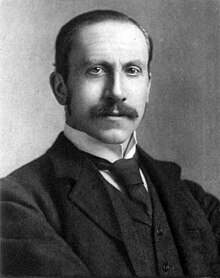
Back Alfred Milner Afrikaans ألفرد ملنر Arabic الفريد ميلنير ARZ Alfred Milner Catalan Alfred Milner, 1. Viscount Milner German Alfred Milner Spanish Alfred Milner Finnish Alfred Milner French Alfred Milner Irish אלפרד מילנר HE
The Viscount Milner | |
|---|---|
 Milner c. 1906 | |
| Secretary of State for the Colonies | |
| In office 10 January 1919 – 13 February 1921 | |
| Preceded by | Walter Long |
| Succeeded by | Winston Churchill |
| Secretary of State for War | |
| In office 18 April 1918 – 10 January 1919 | |
| Monarch | George V |
| Prime Minister | David Lloyd George |
| Preceded by | Edward Stanley, 17th Earl of Derby |
| Succeeded by | Winston Churchill |
| 1st Governor of the Transvaal and Orange River Colony | |
| In office 23 June 1902 – 1 April 1905 | |
| Monarch | Edward VII |
| Preceded by | Himself as Administrator of the Transvaal and Orange River Colony |
| Succeeded by | William Palmer, 2nd Earl of Selborne |
| Administrator of the Transvaal and the Orange River Colony | |
| In office 4 January 1901 – 23 June 1902 | |
| Monarchs | Queen Victoria Edward VII |
| Lieutenant | Hamilton John Goold-Adams |
| Preceded by | Office Established Christiaan de Wet As State President of the Orange Free State (31 May 1902) Schalk Willem Burger As President of the South African Republic (31 May 1902) |
| Succeeded by | Himself As Governor of the Transvaal and Orange River Colony |
| Governor of the Cape Colony and High Commissioner for Southern Africa | |
| In office 5 May 1897 – 6 March 1901 | |
| Monarchs | Queen Victoria Edward VII |
| Prime Minister | John Gordon Sprigg William Schreiner John Gordon Sprigg |
| Preceded by | Sir William Howley Goodenough |
| Succeeded by | Sir Walter Francis Hely-Hutchinson |
| Personal details | |
| Born | Alfred Milner 23 March 1854 Gießen, Upper Hesse, Grand Duchy of Hesse |
| Died | 13 May 1925 (aged 71) Great Wigsell, East Sussex, England |
| Resting place | Saint Mary the Virgin Church, Salehurst, East Sussex, England |
| Nationality | British |
| Spouse | Violet Milner |
| Alma mater | University of Tübingen King's College London Balliol College, Oxford |
| Occupation | Colonial administrator, statesman |
| Signature |  |
Alfred Milner, 1st Viscount Milner, KG, GCB, GCMG, PC (23 March 1854 – 13 May 1925) was a British statesman and colonial administrator who played a very important role in the formulation of British foreign and domestic policy between the mid-1890s and early 1920s. From December 1916 to November 1918, he was one of the most important members of Prime Minister David Lloyd George's War cabinet.
Milner was born in the Grand Duchy of Hesse in 1854 and was educated in Germany and England before attending Balliol College, Oxford, where he graduated with a first class in classics. Though he was called to the bar in 1881, Milner instead became a journalist before entering politics as a Liberal before quickly leaving the party in 1886 over his opposition to Irish Home Rule. He joined the staff of Chancellor of the Exchequer George Goschen and was posted to Egypt as under-secretary of finance. He briefly chaired the Board of Inland Revenue until April 1897, when he was appointed Governor of the Cape Colony and High Commissioner for Southern Africa by Joseph Chamberlain following the disastrous Jameson Raid.
As Governor and High Commissioner, Milner was a leading advocate for British subjects of the Transvaal and Orange Free State, and his policy precipitated the Second Boer War. During the war, Milner received praise and criticism for his civilian administration in South Africa, including the establishment of concentration camps to intern the Boers. Following the British victory and annexation of the Boer republics, Milner was named their first British governor. Upon his return to England in 1905, he faced censure for the use of corporal punishment against Chinese labourers. He remained a firm advocate for British imperialism for the remainder of his life. Through his influence on young civil servants and imperialists, including Lionel Curtis and Leo Amery, Milner's influence on the British Empire extended through the Second World War.
During the First World War, Milner served as a key advisor and cabinet member to Prime Minister David Lloyd George. During the March 1918 collapse of the Western Front, Milner coordinated the consolidation of Allied forces under the commander of Ferdinand Foch, whom he personally selected as Supreme Allied Commander. Foch won the Battle of Amiens, repelling the German advance and turning the tide of the war. Milner was appointed Secretary of State for War for the duration of the conflict, which resulted in an Allied victory and armistice in November 1918. At the subsequent Paris Peace Conference, Milner was a leading delegate and a signatory to the Treaty of Versailles. He served as Secretary of State for the Colonies for the remainder of his public career.